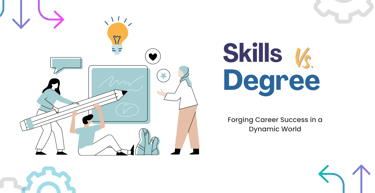
Degrees vs. Skills: Striking the Right Balance for Future Success
Exploring the evolving landscape of career success, this blog delves into the paradigm shift from degrees to skills in the era of advancing technologies like AI and chatbots.
Kamal Shahid


The debate over the relative value of degrees and skills has gained traction in this era of swift technological progress. As an individual with extensive experience in the domains of Electrical Engineering, Telecommunication, and Education, I am well-versed in the discussion around the importance of formal education against the usefulness of skills. The question still stands: is it better to put more emphasis on earning a degree or just hone skills that will help one succeed financially in the future?
Understanding the Significance of Degrees
Traditional Value of Degrees
Degrees, which offer an organised learning environment that promotes critical thinking, research skills, and a thorough understanding of a particular field, have historically been the cornerstone of academic performance. They offer a foundation, equipping individuals with fundamental knowledge essential for professional roles.
Academic Foundation and Credibility
Degrees are a symbol of devotion, discipline, and hard work in a specific field. They act as evidence of a person's academic excellence and frequently open doors to opportunities that call for a formal degree. Furthermore, a degree serves as a prerequisite in several occupations, giving employers assurance about a candidate's level of knowledge.
Rising Importance of Skills
Evolution of Industries due to Technology
The industrial landscape has changed dramatically, particularly in the area of chatbots and artificial intelligence. Particular skill sets are in high demand, which is spurring innovation and change. Technical proficiency, flexibility, and the capacity to keep up with technology developments have become essential.
Skills-Based Market Patterns
The focus is moving towards skills in the rapidly evolving labour market. Candidates with practical experience, problem-solving skills, inventiveness, and adaptability are given preference by employers. In addition to enhancing formal education, skills help people succeed in fast-paced professional settings.
Degrees vs Skills
Complementary Aspects of Education and Skills
Degrees provide theoretical information, but skills enable people to put that knowledge to use in real-world situations. It is indisputable that education and skills work well together; rather than being mutually exclusive, they are integrated elements that support success in the workplace.
Getting Used to a Changing Environment
Recognising that industries are transforming, adaptation is essential. By adopting a lifelong learning mindset, people can use their degrees as a starting point while continuously improving their abilities to stay competitive.
Navigating Career Success
Leveraging Degrees and Skills Harmoniously
The key lies in striking a balance. By using their educational background and skill set, people can create a distinct professional path. Relevance and resilience are ensured by upskilling, maintaining current with industry developments, and engaging in constant learning.
Techniques for Developing on the Personal and Professional Level
Investing in education provides a robust framework, while honing skills amplifies practical applicability. Engaging in internships, workshops, and networking opportunities enhances skill sets, complementing the knowledge gained through formal education.
Conclusion
In the pursuit of a prosperous career, the dichotomy between degrees and skills diminishes when viewed as complementary assets. A degree offers a solid foundation, while skills enhance adaptability and problem-solving capabilities. Embracing both facets equips individuals to thrive in an evolving landscape.
FAQs
Is a degree still relevant in today's job market?
Yes, a degree provides foundational knowledge and credibility.
Are skills more important than a degree for career success?
Skills are increasingly crucial, complementing formal education for a well-rounded professional.
How can one balance acquiring a degree and developing skills?
By utilizing the academic foundation of a degree and continuously enhancing skills through practical application.
What role do lifelong learning and upskilling play in today's career landscape?
They are pivotal for staying relevant and competitive amidst industry advancements.
Can one succeed solely based on skills without a degree?
While possible in certain fields, a degree often acts as a foundational advantage, but skills can equally pave the path to success.
LEAVE A REPLY

